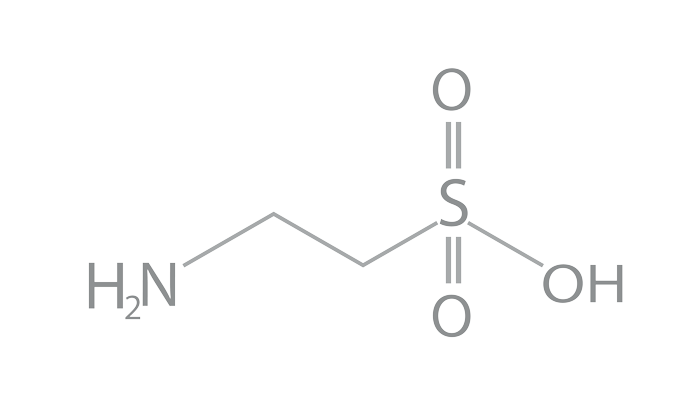WHAT IS
Taurine?

Taurine is a semi-essential amino acid involved in nearly every aspect of our health. Taurine is made from cysteine and methionine in the liver. It is considered to be the most abundant amino acid in the heart, retina, skeletal muscle, brain and immune cells. It plays many important roles in the body.
The main role of taurine for our body are : forming bile salts, which play an important role in digestion, regulating minerals such as calcium within cells, supporting the general function of the central nervous system and eyes, regulating immune system health and antioxidant function. It may reduce the risk of heart disease thanks to its ability to decrease blood pressure and inflammation and it can also lower the level of fat in the blood. It also acts as a powerful antioxidant by helping our system fight harmful free radicals and by preventing oxidative stress on the body.
Taurine deficiency is rare, the effects are still unknown in humans. But animal studies show that taurine deficiency causes a number of damages such as eye damage, chronic liver disease, muscle weakness and an increased risk of developing diabetes.
That being said, an excess of taurine through the consumption of dietary supplements may cause vomiting, nausea, liver pain, headache and stomach pain. It should be noted that there are few studies showing this.
There are plenty of natural sources of this important amino acid naturally available in our foods. Foods containing high amounts of taurine include seafood (e.g. clams, octopus, shrimp), fish, meat (e.g. beef, pork, lamb), poultry and legumes (e.g. black beans, chickpeas). Note that people who eat only plant foods but no animal products are at increased risk of taurine deficiency because the precursors of taurine (methionine and cysteine) are present at low levels in most plant proteins (e.g., corn, potatoes, rice, wheat and vegetables).
Taurine is not used to build proteins, but it has multiple physiological functions important to athletes. In sports, taurine could improve muscle contraction and delay muscle fatigue. It supports the central nervous system, regulation of calcium homeostasis in both skeletal muscle and cardiac tissue. It may also increase oxygen uptake by the body, increase fatigue time, reduce muscle damage as well as improve recovery time, strength and power. Taurine also has antioxidant properties, which means that it protects tissues from oxidative damage.
In conclusion, our taurine levels impact many aspects of our mental and physical health. In order to make sure that your taurine levels are balanced and steady, make sure to test your levels and to evaluate how you can make the right changes to rebalance your body and mind.
Biomarkers

